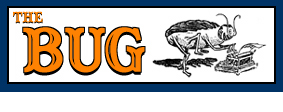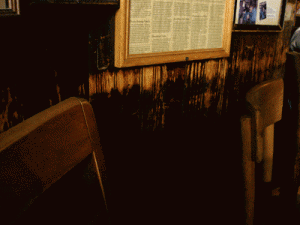 My Dad tells me of this place he calls “The Secret City”. The Secret City doesn’t exist in one place–in fact, it exists in many places, all over the world. It is that wonderful store or restaurant that does something exceptionally well, something out of the ordinary, and is, of course, a secret to most of the world. Beanbender’s Beer Garden, featured in D. Manus Pinkwater’s Snarkout Boys and the Avocado of Death is such a place, albeit in literature and not life, and one I’ve been looking for all my life (as is the Snark Theater as well, and its all-night buffet of classic black and white films).
My Dad tells me of this place he calls “The Secret City”. The Secret City doesn’t exist in one place–in fact, it exists in many places, all over the world. It is that wonderful store or restaurant that does something exceptionally well, something out of the ordinary, and is, of course, a secret to most of the world. Beanbender’s Beer Garden, featured in D. Manus Pinkwater’s Snarkout Boys and the Avocado of Death is such a place, albeit in literature and not life, and one I’ve been looking for all my life (as is the Snark Theater as well, and its all-night buffet of classic black and white films).
Whenever I’m on the road I seek refuge in the Secret City. On this trip I found it in such places as Yastrzemski’s Cards and Sal’s Pizza in Cooperstown; the Chinese restaurant whose name I forgot in NYC (but whose more sweet than hot General Tso’s chicken was incredible); that part of Grand Central Station where you can stand opposite one another, whisper into the wall, and be heard across the room; and Dutch’s Beer Dock in Cincinnati. I imagine, long ago, in the 40s, McSorley’s Bar was a part of the Secret City until Joseph Mitchell exposed it to the world in the pages of the New Yorker. No matter. Despite its popularity, McSorley’s is a place that boggles the mind–while perhaps no longer a secret in this world, secret little worlds exist in every groove gouged into the floorboards.
I had to go to McSorley’s because of Joseph Mitchell’s Up in the Old Hotel, a collection of his essays from the New Yorker, most chronicling interesting characters that habituate Gotham. The book floored me when I first read it, and it made me want to stop just writing whatever and whenever and really start paying attention to people, and become a writer in general.
Up in the Old Hotel opens with an essay entitled “The Old House at Home”, which is about McSorley’s and its various irritable owners. That was the first essay of this very influential book in my life, and I had to go check that bar out. I had to wander about to try and find the place, and when I did it looked as if the little tavern was going to be swallowed up by the mammoth construction project across the street.
I stopped outside and did what no doubt hundreds of other Mitchell-hounds have done over the years–pull out the little camera and take a photo that’s of interest to no one but the photographer. Inside, there it was, exactly as Mitchell described it: the old stove, the giant bar with its dinged-up brass bar, the walls crammed full of various tchotchkes.
About the latter I was happy to see that they weren’t frozen in time. This was good–McSorley’s didn’t just rest in the past, but enjoyed making room for such various crap as old book jackets from the 70s, photos of George Pataki, another of Daniel Day-Lewis promoting Gangs of New York. Behind the bar you can purchase a copy of bartender Geoffrey Bartholomew’s McSorley Poems, or grab the house copy and peruse it at your leisure. As I did.
What isn’t in Mitchell’s piece could fill a brand new essay, perhaps even a book (one longer than the McSorley Poems). What was missing from the original were the smells: stale beer (though the beer is good), mustard, hamburgers, and people–some student’s heavy cologne, sweet pipe tobacco rising off another man’s shoulders (from an outside puff of course as there’s no more smoking in the Old House), and that odor of old men who perhaps don’t bathe regularly. There were tourists inside–hell, I was one of them. There was a guy in a Detroit Tigers hat, and another taking pictures with a giant digital camera.
But there were a couple of fixtures–one old guy who leaned into the stove as if it were ten degrees outside. I think my favorite part was in the wood paneling, where 150 years of slouching patrons had worn grooves into the wood. Had Mitchell leaned back, with one of those tiny mugs of beer, observing the place on a cold night?
Most amazing, perhaps, is that McSorley’s works. And by that I mean that this visit turned out not to be just an exercise in nostalgia or a pilgrimage of a guy wanting to get near a favorite author’s haunt. It was both of those, yes, but it was also an ale house and a perfect tonic for New York City.
Listen: McSorley’s works. No menu. No television. Natural light that mingles with the waxy yellow lamplight. Good beer that comes in pairs. The place had the same effect on me as it had the men who’d languished over drinks all the years past. I was utterly, totally relaxed.
It was a great time. I wrote in my journal (what you’re reading now), and discussed the Iraq war with a National Guardsman who complained that their shrimp salad sandwiches were growing smaller and smaller, which prompted him to reflect upon the international food crisis. Mr. Bartholomew, the bartender and poet, seeing that I wasn’t reading the house copy of his book but merely hoarding it, came over and gruffly stole the book back. But when I bought a copy, he still signed mine.
From McSorley’s I made it out of New York City, not before scoring a ticket for making a right on a red–and getting the wrong directions from the cops, so wrong, in fact, I think they were being malicious. I spent the weekend in Connecticut, one of the strangest states in the nation. Barely an hour out of the madness of New York City and there’s Connecticut. Giant homes tucked into rocky, woody landscapes, and no light. It’s pitch black there in the darkness, the sky opening up, as dark as the Boundary Waters of Minnesota. The lakes are surrounded by a ring of deep, black forest. Cell phone service is awful, as the denizens don’t want any cell towers wrecking the look of the place.
I was there for a visit with an old friend and former boss, one Peter Presperin and family. I used to be Peter’s secretary at the old St. Paul Insurance Company–I was the only male secretary in the company, and happened to work for a guy who shared my first name. Ah, the hilarity. Additionally, Mr. Presperin bestowed upon me a wonderful gift when he left the employ of said insurance concern: a Waterman fountain pen. I write all my first drafts in longhand, and this pen was used to write the book which launched me on this tour.
Cincinnati is another story. I’m utterly gassed. All the driving on the trip has resulted in a fatigue I can’t shake. I’ve been relaxing at my stepmother Pam’s house, enjoying the coffeeshops in her neighborhood. The reading here was the worst of the lot: sent out to a distant Barnes and Noble in the far suburbs, I don’t know if it’s the fact that The End of Baseball’s flying under the radar or that they just don’t know how the living fuck to promote an event like this, but I think it’s more the latter than the former. Clearly they didn’t expect a crowd, as there were all of four seats for my audience.
To make matters even better, I was shoved in the entrance way of the place. That’s right, people would be walking in and have to get by me to make the magazine racks. The manager didn’t even introduce me to the six people who made it.
But this trip has been an amazement nonetheless. I look back in wonder at some of the people I met, old friends I haven’t seen in forever, and that attendant happiness you feel when you see them doing well for themselves, and happy. Or the strangers who came up to me at a reading eager to buy my book and ask questions. That blows me away. Each of us in this Secret City, leaning back and toasting one another, making a little groove in the wall.

